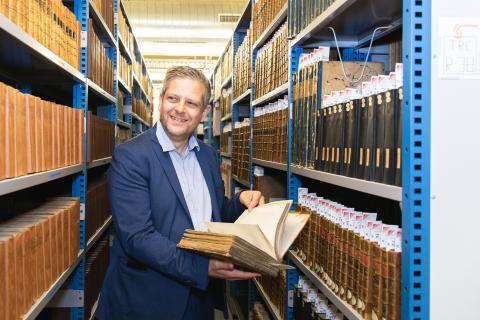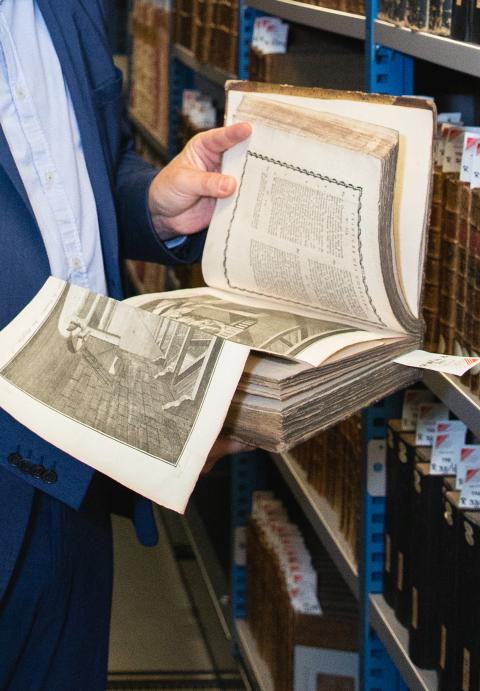What we can learn from historic trading centers
There is a lot to learn from the great European trading centers of the 15th to 17th centuries. Professor of Legal History Dave De ruysscher is quite familiar with the law that was applied in these cities and this continues to fascinate him. “The law evolves very slowly. Some legal concepts have been around for a very long time, so traditions are extremely important. The historical background is not only interesting, it also helps us understand the existing law.”
Photography: Gerdien Wolthaus Paauw
CaPANES (Causal Pattern Analysis of Economic Sovereignty) is the name of the new large legal history project that will be launched at Tilburg University in 2023. Dave De ruysscher received a European ERC Consolidator Grant to the amount of € 1.9 million for it, which underlines the importance of legal history research for the future of Europe.
The historical importance of, for instance, Roman law can still be felt today. Take the present-day concept of ‘contract’. It is derived from Latin contrahere and contains elements that were pioneered by the Romans, De ruysscher explains. They were very focused on relationships among individuals, just like we are today. In the Middle Ages, in which the focus had shifted to the community, the Roman ‘contract’ was conceived differently, even though the original elements continued to exist. From the 16th century onwards, individualism became more dominant again, whereby the law of contracts found inspiration again in old Roman law. However, you can see that present-day globalization is now leading to fundamental problems: the power of governments to intervene in relations between two private parties who have made a commercial arrangement is limited, especially in cross-border contracts.
“On the American stock exchanges for instance, the Nasdaq and the Dow Jones, a large part of the investors is non-American. Government intervention in the stock market was still a totally domestic matter in the 19th century, when almost all investors were Americans, but that is no longer the case. Or take the rising interest rates: all central banks look to the American Federal Reserve, but the latter is primarily focused on the interests of the United States itself. That creates tension worldwide – and that, too, is legally a tricky matter to deal with.”

In sum: states only have limited leverage in the globalized economy and this is giving rise to problems. Since the 1990s, uniformity in worldwide trade seemed a good thing, but we are increasingly reconsidering the whole idea. Different countries need different solutions.
European trading centers
That situation is a parallel of similar circumstances in international trade in the 17th century and the two preceding centuries. That is the reason that, in the CaPANES project, important European trading centers with international networks in different countries will be investigated and thus also their different relations with the state: these cities are Bruges, Southampton, Rouen, Toulouse, Lübeck, and Florence. Florence for instance was a city state in itself with a lot of clout, whereas in France and England, government was centralized and very powerful, which left less autonomy to cities. The position of Bruges was somewhere in the middle.
How did those trading centers operate in these different situations? How did they legally represent their power in trade relations? The various legal solutions found in those times for the divergent contexts could be important for us today.

The various legal solutions found in those times for the divergent contexts of trade relations could be important for solving current problems
“In the 15th century, the modern states emerged,” says De ruysscher, “so the economy became ever more centralized and regulated. The importance of that period for us is that many cities operated relatively independently, despite or maybe even thanks to this centralization. It was truly a watershed period. In the 16th century, the cities found inspiration in Roman law to strengthen their positions. Also, the Greek concept of emporion, or market, grew popular in the cities, as an idea to describe urban power. We can draw lessons for today's problems from the way in which these legal concepts were given substance in the trade relations among cities centuries ago.”
Economic sovereignty
The central concept in the CaPANES project is ‘economic sovereignty’: in the broadest sense of the term it is the power of a state to regulate the economy, for instance, by imposing taxes, concluding commercial treaties, or minting coins. But especially in legal research, it is often overlooked that economic sovereignty is also dependent on international networks and trade flows, and therefore on the relationships among states and their representatives.
Redefining the concept of economic sovereignty can reinforce the position of present-day world cities
Over a period of five years and together with five PhD students and one postdoc researcher, De ruysscher will use network analyses to discover how municipal executives, merchants, and members of the traveling intellectual elite described their relationships to their home cities and each other. Causal patterns are to uncover the influence that the different conditions in the cities had on the development and interpretation of the concept of economic sovereignty. For instance, how did powerful banking firms in Florence succeed in asserting hegemony? How did they describe themselves in relation to their home town?
“Redefining the concept of economic sovereignty can reinforce the position of present-day world cities, for instance, New York, Shanghai, and Rotterdam,” says De ruysscher. This historical research also contributes to this in an innovative way: sovereignty is not perceived as a dogmatic concept as in classical legal research; it is approached from an empirical angle. Data can be gathered from historical sources, which is a relatively new approach in international law. De ruysscher’s expectations of this approach are high: “It is the future.”
See also: ERC Consolidator grant of € 1.9 million to analyze legal concept of economic sovereignty
Would you like to receive this magazine in your inbox?
Yes, I would like to receive the online Tilburg University Magazine by e-mail. It is published two to three times a year.
Date of publication: 12 July 2022
